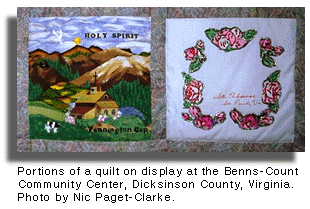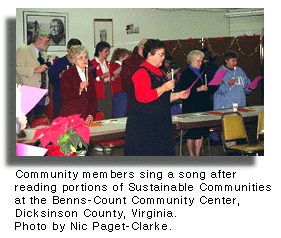In this letter we wish to explore
the new tasks which lie before us
particularly the task of creating or defending
what are called
"sustainable communities"
These are communities where people and nature
can live together in harmony
and not rob from future generations.
Many thoughtful people worry that
in the post-industrial age
Appalachia will no longer be sustainable
They fear that Appalachia may become
a place only for
- large scale unemployment;
- the death of small local business;
- clear-cutting the forests;
- dumping out-of-state garbage;
- even dumping toxic radioactive materials;
- and warehousing prisoners from the cities.
In this unsustainable path for the future
Appalachia would become a waste-land.
If this path were to be followed
the local people and the local ecology
would be devastated.
 Broader Implications
Broader Implications
We do not see this conflict
between a culture of death and a culture of life
as simply an Appalachian crisis
Rather we see the Appalachia crisis
as a window into a larger- crisis
which now threatens the entire society
including the middle class
and indeed the full ecosystem
across the entire planet.
In response to this ancient message
we believe that we are still called:
- to defend Earth and the poor together,
- to learn from the wisdom of both;
- to care for God's single web of life.
In these tasks
the land and the people of Appalachica
are once again a precious gift to us all
Over millions of years
where the Ice Age never reached,
winds and rains softened these rnountains
made them more round and gentle
and carved within them
so many valleys and coves
and ridges and hollows.
To dwell within these mountains
is to experience
- in their height, God's rnajesty
- in their weight God's strength
- in their hollows God's embrace
- in their waters God's cleansing
- in their haze God's my stery
These mountains are truly a holy place.
So too with the plants of this forest.
Here there flourishes
one of the richest biosystems in the world.
Indeed the woods are full of
medicinal plants and glorious flowers.
We recall especially
- mountain laurels and rhododendrons,
- azaleas and mountain magnolias,
- blossoms on tulip poplars and black locusts
- ginseng and yellow root.
Perhaps 3,000 to 4,000 years ago
the native peoples developed agriculture.
They grew corn and beans
and pumpkins and squash.
But they still journeyed to the mountains
for hunting and trade.
The original European settlers
often Scots-Irish,
brought their own gifts to the mountains.
We still love their Keltic melodies,
as well as folk instruments like the fiddle
And we still admire their crafts
particularly their stunning quilts.
These early settlers carried
an ancient "green" Keltic spirituality
rooted in the beauty of God's creation.
The freed African slave
also brought their rich spirituality
- echoing in the rhythm of the drum
the maternal heartbeat of all creation;
- singing great songs of faith and praise
to celebrate the wonder of all creation;
- proclaiming in magnificent preaching
God's own majestic word.
With new highways it was hoped that
"developrnent" would come to the region
But by and large "development" did not come
And now so many good people
find themselves without work
The post-industrial crisis was already starting
But large super-stores did come to Appalachia
They brought new consumer goods
but unfortunately they also often
undermined rooted businesses
drained capital over from the region
weakened local government
bled resources from smaller rural towns
They also fostered the modern consumer society
the very opposite of Appalachia's old traditions
of artistic simplicity and creative crafts
Tllese same remote rural areas
have also been identified
as places for countless new prisons,
where human beings from distant cities
themselves filled with unemployment
are being dumped off
as if they were social waste
Meanwhile local governments
again especially in remote rural counties
are being tempted to depend for revenues
on the dumping of out-of-state waste
or else on new prisons
as the only way of creating jobs
At a Crossroads
Because across so many Appalachian counties
this unsuitable econornics
now threatens both natural and social ecology,
the region stands at a historical crossroads.
That very idea
that economics should threaten
both natural and social ecology
is a contradiction.
For the word "economics"
comes from the Greek oikos and nomos,
which together mean "ordering of the horne."
Similarly the word "ecology"
comes from the Greek oikos and logos,
which together mean "logic of the home"
How can economics and ecology,
as the logic and order of the home"
be mutually opposed?
For the "home" is only one place.
As we enter this dangerous transition,
it is now clear that the industrial working class
and much of the corporate middle class
are, as they say, ''downwardly mobile."
Jobs ale disappearing and income is falling.
It is also clear that in American society
in terms of wealth as well as income,
the top has been gaining
and the bottom has been losing.
And again, at the intimate level,
tragically those who are victimized
sometimes fall prey to rage and despair,
and sometimes wrongly express their anger
in crimes against themselves and others,
and in violence against women and children.
In one path, which is not sustainable,
Appalachia will be devastated
by uprooted outside capital
and by uprooted inappropriate technologies,
unaccountatble to local communities
and converting people and nature
into waste from the consumer society.
In the other path, which is sustainable,
the people and land of Appalachia,
using their own rich gifts
in social and ecological cooperation,
and taking advantage of
the new tools of the electronic age,
will form authentic local communities
rooted in God's sacred web of life
In our regional hearings,
we could not help but feel people's deep anxiety,
as they face this crossroads
Countless folks told us about their worries:
- lack of good jobs,
- smaller, paychecks in remaining jobs,
- large amounts of unemployment,
- a harder time making ends meet,
- young people having to leave the region,
- people in their prime despairing,
- lack of health care,
- local businesses closing
- whole towns dying,
- great pressures on families,
- incleased drug and alcohol abuse,
- violence against women and children,
- more crime, murder, and suicide,
- abandonment of families,
- the elderly being left alone,
- contamination of the waters,
- pollution in the mountain haze,
- flooding in the hollows after erosion,
- acid rain in the high altitudes,
- and so much more.
To this we add our own worries that,
as the social and ecological crisis increases,
a new selfishness spreads across the land,
and not only in Appalachia
We see this more broadly in:
- abandonment of the poor,
- increase of racisrn and scapegoating,
- demands for more and more guns,
- growing use of the death-penalty,
- campaigns for abortion and euthanasia,
- regional wars across the planet
One main reason for these worries
is that we are now experiencing
- the death of the modern industrial age, and
- the birth of a postmodern electronic age,
Sustainable Communities
The Spirit of God is always active in history
bringing forth frorn emptiness and chaos
ever fresh creativity.
We call these new ways
the path of sustainable communities.
These are communities which will
- conserve and not waste
- be simpler but better
- keep most resources circulating locally
- create sustainble livelihoods,
- surport family life
- protect the richness of nature
- develop people spiritually
- and follow God's values.
Sustainable Forestry
Since Appalachia is basically forest
one of the most precious gifts
which God has given to the people
is the forest itself.
In this model there is no clear cutting.
Mature timber is selectively harvested
while the forest itself is sustained
in all its biodiversity.
In addition there is great care
in the felling of cut trees,
so as not to damage the remaining ones.
Then the logger cuts the tree into logs
while still in the forest
and even uses draft horses
to pull the logs out,
so as not to damage the forest.
Ideally the logs are dried locally
by means of a solar kiln.
In this model of forestry
Ihe crop lasts forever
and the forest's biodiversity remains intact.
It is important to remember here
that the forest is more than the trees.
It is a whole biosystem
with countless life forms
all of which form an ecosystem.
Sustainable Families
Sometimes our local communities
are devastated from the outside,
but sometimes they are also
devastated from the inside --
in the very soul.
Perhaps the worst internal devastation
of local families and communities
comes from domestic violence,
This is not simply an Appalachian problem,
but a problem of the whole world.
Families often become unsustainable
when people lose their sense of self-worth,
particularly when they are out of work,
or under great hardship.
Clearly the present econornic crisis,
not only in Appalachia but around the world,
is for many individuals and families
one of those moments of great hardship.
In this difficult social context,
there arises the terrible temptation
for family members to take it out on each other,
often with husbands battering wives.
and often with parents abusing children.
Often driving such violence are
destructive addictions to:
- the abuse of alcohol,
- the abuse of drugs,
- the abuse of sex.
Through an addiction,
a person tries to gain power.
but it is not a life-giving power.
Rather all addictions reveal
the destructive face of sin.
Addictions block a person's creativity,
by repressing the image of God.
Instead they make the person serve an idol,
and then point the addicted individuals,
and sometimes those around thern,
slowly towards death.
We also know that addictions
are often accompanied by
what are called codependencies.
Where the addict seeks abusive power
the codependent rejects good self-power
claiming to be completely helpless.
Here too there is
a disfiguration of the image of God
deep within the soul.
But we trust in Jesus healing love.
And so we know that
these great wounds can be healed.
To help wounded families to find healing
and to become emotionally sustainable
we need prayer and forgiveness
but not a false forgiveness
which covers up the problem.
For loving forgiveness
must always be based on truth.
To live the truth in love
we need personal and family supports
rooted in the local community.
Much More to Say
These are oniy some
of the experiments and ideas
presently being explored in Appalachia.
Once again we praise them
as creative seed of a new civilizaton
serving the web of life.
There are other great needs too,
and no doubt other important experiments
also responding to these needs.
Here we think of the many young people
who have been forced to emigrate
out of the mountains to the cities.
We wish to point out the need
for church organizations to serve migrants
in the cities where they have gone.
We also think of holistic health care,
and, in addition of creative education,
as pressing needs of local communities,
But there is not space here
adequately to address all these issues.



 Sustainable Communities is a pastoral message issued in 1996 as an update to the Pastoral Letter "This Land is Home to Me" published twenty years ago by the Catholic Bishops of Appalachia. The original pastoral letter addressed the themes of poverty and powerlessness in the region and 200,000 copies were distributed.
Sustainable Communities is a pastoral message issued in 1996 as an update to the Pastoral Letter "This Land is Home to Me" published twenty years ago by the Catholic Bishops of Appalachia. The original pastoral letter addressed the themes of poverty and powerlessness in the region and 200,000 copies were distributed. Broader Implications
Broader Implications